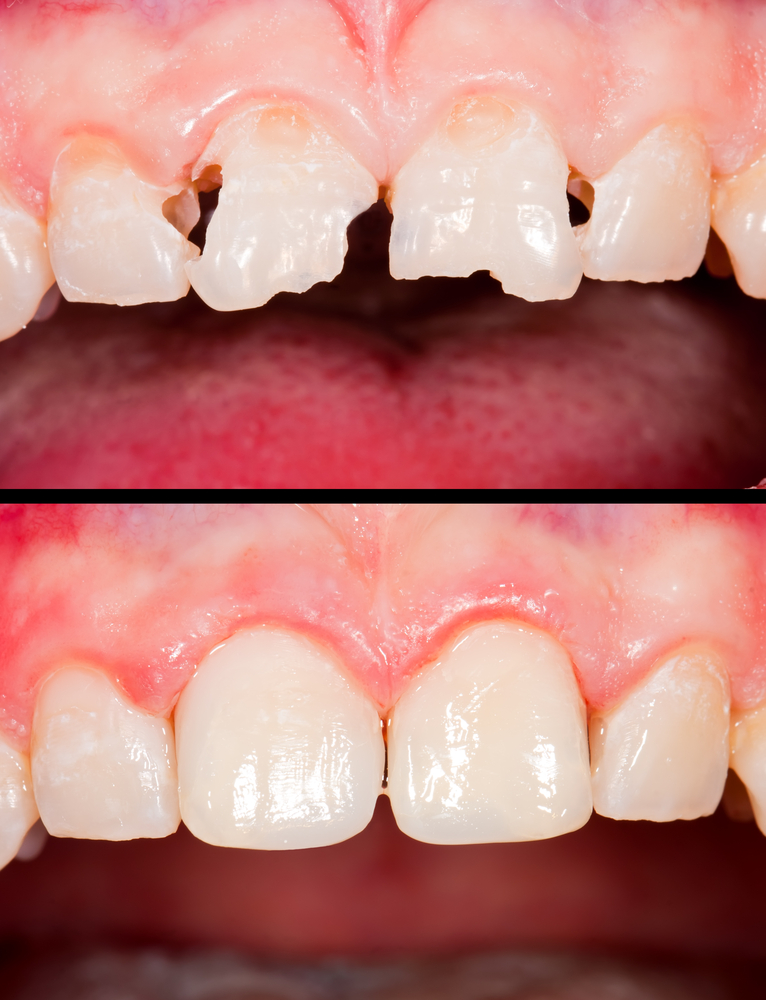When a chip mars your pearly whites, it can be an unwelcome sight. A front tooth chip, in particular, can make you feel self-conscious about your smile. If you’re facing this dental dilemma, don’t fret! This article will delve into the world of front tooth chips, providing you with a comprehensive guide to repairing and restoring your smile.
&w=&do-not-index)
Image: parkerwestdental.com
Understanding Front Tooth Chips
A chip in your front tooth can be caused by various factors, including accidents, chewing on hard objects, or even biting down on ice. The severity of the chip can range from a minor nick to a more noticeable break that affects the tooth’s structural integrity. Understanding the type of chip you have will help determine the most suitable repair method.
Minor Chips
Minor chips, also known as microfractures, are small and superficial cracks on the tooth’s surface. They typically do not affect the tooth’s structural stability and can often be repaired with simple procedures such as bonding or polishing.
Moderate Chips
Moderate chips involve larger breaks in the tooth’s enamel or dentin layer. They may cause some sensitivity or discomfort but can still be repaired with dental composite materials or crowns.

Image: asapdentist.com
Major Chips
Major chips or cracks extend into the innermost layer of the tooth, the pulp. They can cause severe pain and require more extensive treatment options, such as root canal therapy or extraction.
Fixing a Small Chip
Fixing a small chip in your front tooth requires professional dental care. Your dentist will recommend the most appropriate treatment method based on the chip’s size, location, and severity.
Bonding
Bonding is a common method for repairing minor chips. It involves applying a tooth-colored composite resin to the chipped area and sculpting it to match the shape of the original tooth. Bonding is relatively quick and affordable, making it a popular choice for many patients.
Veneers
Veneers are thin, porcelain shells that are placed over the front surface of the tooth. They can conceal chips, cracks, and other imperfections, giving you a more aesthetically pleasing smile. Veneers are more durable than bonding but also more expensive.
Crowns
Crowns are full-coverage restorations that fit over the entire tooth. They are recommended for more severe chips or cracks that affect the tooth’s strength. Crowns provide excellent protection and durability, but they also require more tooth preparation and can be more costly.
Tips for Prevention
Once you’ve fixed a chipped tooth, preventing future damage is crucial. Here are some tips to protect your pearly whites:
Practice Good Oral Hygiene
Brush your teeth twice a day, floss regularly, and visit your dentist for routine checkups and cleanings. Proper oral hygiene helps prevent cavities and strengthens your teeth.
Avoid Chewing on Hard Objects
Chewing on hard objects, such as ice, candy, or toothpicks, can weaken your teeth and increase the risk of chipping. Opt for softer foods and use dental tape to cut tough meats or vegetables.
Wear a Mouthguard
If you participate in sports or activities that pose a risk of mouth injury, wear a custom-fitted mouthguard to protect your teeth. Mouthguards can prevent chips and breaks from impact.
FAQ
Q: What is the best way to repair a small chip in my front tooth?
A: The best repair method depends on the size and severity of the chip. Your dentist will recommend the most suitable option, such as bonding, veneers, or crowns.
Q: How long does it take to fix a chipped tooth?
A: The time it takes to fix a chipped tooth varies depending on the repair method used. Bonding and veneers can usually be completed in a single visit, while crowns may require multiple appointments.
Q: Will a chipped tooth affect my oral health?
A: Minor chips may not affect your oral health. However, larger chips or cracks can compromise the tooth’s structural integrity, making it more susceptible to further damage and infection. It’s important to seek professional repair promptly to prevent complications.
Q: Are there any home remedies for a chipped tooth?
A: It’s not advisable to attempt home remedies for a chipped tooth. Dental injuries require professional treatment to ensure proper repair and prevent further damage.
How To Fix Small Chip In Front Tooth
Conclusion
A chipped front tooth can be a frustrating aesthetic concern with potential oral health implications. Understanding the different types of chips and available repair methods will help you make informed decisions about your dental care. By following preventive measures and seeking professional treatment promptly, you can restore your smile and maintain strong and healthy teeth for years to come.
Is fixing a small chip in your front tooth a topic that interests you? Share your thoughts and experiences in the comments section below!